Simone Manuel, swimming against current of stereotypes, an inspiration to others
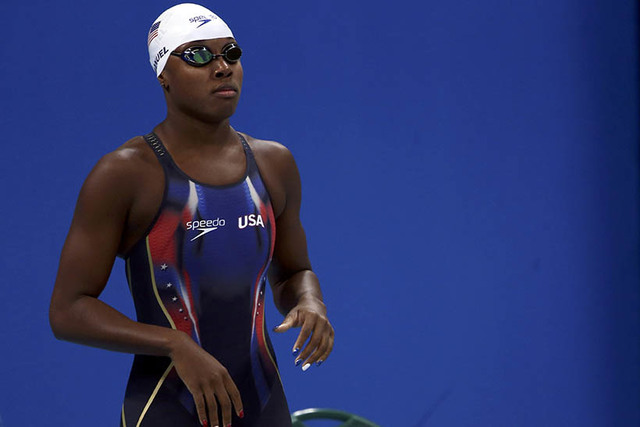
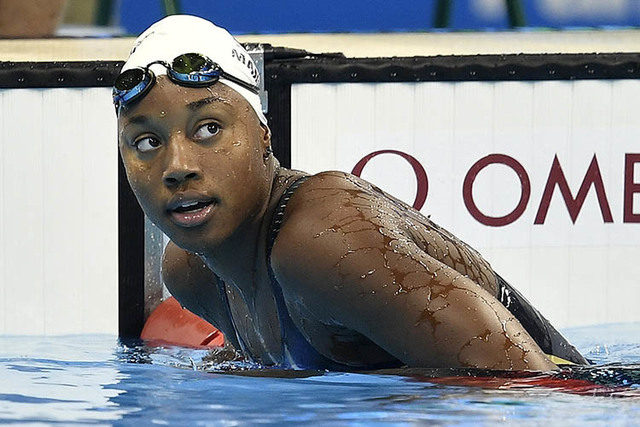
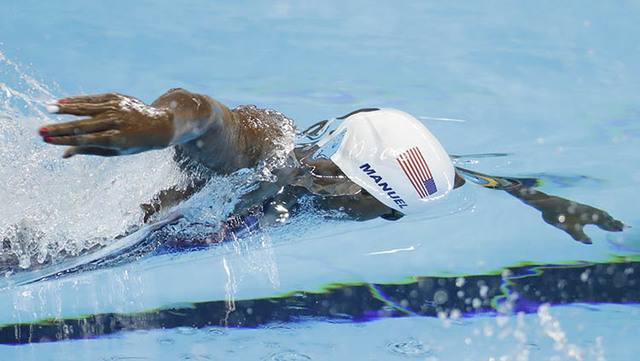
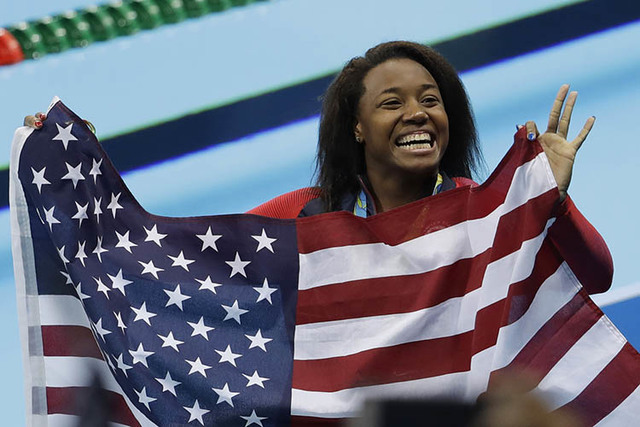
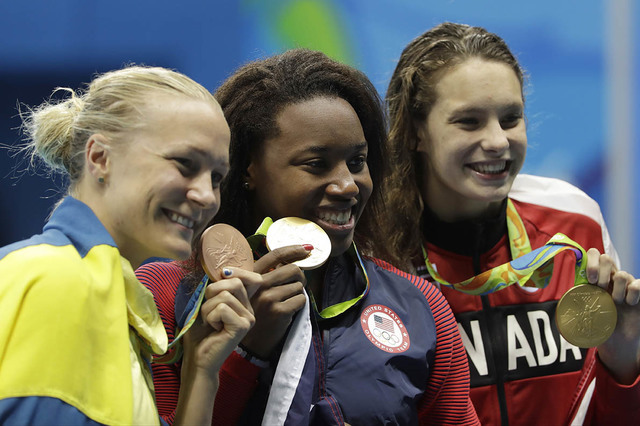
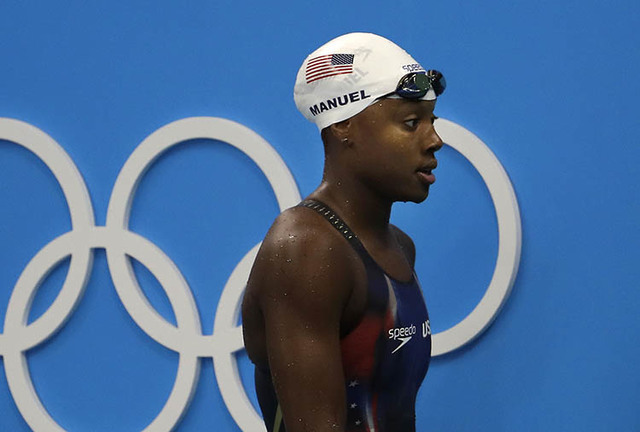
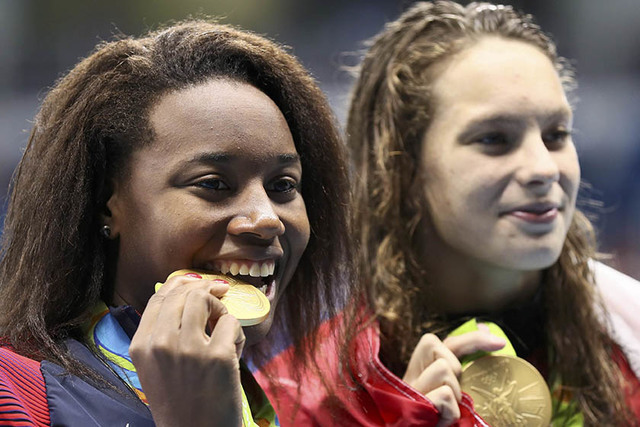
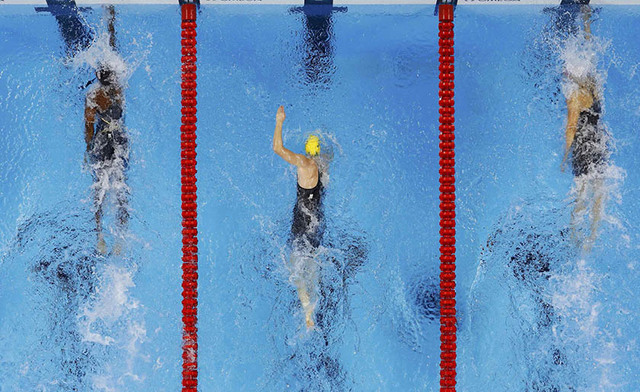
RIO DE JANEIRO – I can’t swim. My grandmother jokes that she never wants to be in more water than she can drink, and I pretty much agree. So does my mother. And my aunts. And my uncles. And most of my cousins.
We’re not an unusual African-American family. The statistics are startling: 68.9 percent of African-American children had “low or no swim ability,” according to a 2010 study commissioned by USA Swimming and conducted by the University of Memphis. For Hispanic children, the number was 57.9 percent. For Caucasians, it was 41.8 percent.
And despite all the “black people can’t swim” jokes that comedians use to bring down the house, these are dangerous facts. Black children ages 5 to 19 die from drowning at a rate 5 1/2 times higher than white children, according to the Centers for Disease Control and Prevention.
So to understand the significance of what Simone Manuel did Thursday night, when she became the first African-American woman to win an individual swimming medal in an Olympics, you have to know the current against which she swam. She hasn’t always liked being singled out as a “black swimmer” because she thinks it has a diminishing connotation, but she realizes how powerful a symbol she now is.
Manuel didn’t just win any medal. She didn’t sneak in at the end and get a bronze. No, she recovered from a poor start in the 100-meter freestyle, blazed at the turn and won gold. She finished in a dead heat with Canada’s Penny Oleksiak to share first place in an Olympic record time of 52.70 seconds.
“It means a lot to me,” Manuel said afterward. “This medal is not just for me. It’s for some of the African-Americans who have come before me and been an inspiration. I hope I can be an inspiration to others, so this medal is for those who come behind me and get into the sport and hopefully find the love and drive to get to this point.”
Manuel provided a thrilling moment for all Americans, especially those who remember old Jim Crow laws that once kept blacks out of white pools in Southern states. When racial integration finally became a mandate, many areas responded by closing public pools so they didn’t have to mix, creating a bigger social divide that transcended race, because if you didn’t have the money to go to a country club or private pool, you either didn’t learn to swim or you tried to learn from an untrained friend or family member in rivers, lakes and even ponds.
That’s the history, and it undoubtedly contributed to where we are today, to this troubling acceptance that swimming – an important life skill – isn’t for everybody. My wife, who is half Caucasian and half Japanese, tries to make me feel guilty about not swimming. She scolds me about being too stubborn. I tell her, “I’m 38. I ain’t getting in no water. I’ll wade and watch you.”
Then she’ll wonder how we can motivate our two young boys to learn to swim with only one parent as a role model. That really bothers me. The aforementioned USA Swimming report also found that, if a parent can’t swim, there’s just a 13-percent chance that the child will learn. It’s a great concern of the United States swimming program, both for safety reasons and a desire to bring more diversity to the pool.
Manuel represents hope. Of all the jokes that comedians make about blacks and swimming, the most popular and depressing involve women. They’re often about not ruining hair. The stereotype is that black women would rather be cute than swim. It’s more practical than that; water wreaks havoc on black hair. Women can’t just move on and let it dry.
To get to the top, Manuel has had to fight against the notion. She knew she had an opportunity to effect change, to promote a different story, to inspire a new generation that wouldn’t have to believe in long-held stereotypes. It’s a kind of pressure that she had to learn to compartmentalize.
“Yeah, that is something I have definitely struggled with a lot,” said Manuel, a 20-year-old from Sugar Land, Texas, who attends college at Stanford. “I tried to take the weight of the black community off my shoulders as it is something I carry with me being in this position. But I do hope it kind of goes away. I am super glad with the fact that I can be an inspiration to others and hopefully diversify the sport, but at the same time, I would like there to be a day when there are more of us, and it’s not ‘Simone, the black swimmer.’
“The title ‘black swimmer’ makes it seem like I am not supposed to be able to win a gold medal, I am not supposed to be able to break the Olympic record, and that is not true, as I work as hard as anybody else, and I love the sport, and I want to win, just like everybody else.”
Manuel has taken any “happy to be here” novelty out of the quest. She is a gold-verified badass. Remember her as that first. And then we can call her an inspiration.
Sixteen years ago, Anthony Ervin, whose father is black and Native-American and whose mother is Jewish, became the first swimmer with African-American blood to win an individual Olympic gold. He didn’t know how to respond to questions about the historic accomplishment because he’s light-skinned and chooses to celebrate his multiracial heritage.
Since then, Maritza Correia in 2004 broke the barrier for women of African descent to swim on Team USA, and she won a silver medal on the 4×100-meter freestyle relay team. Then Cullen Jones excelled in the 2008 and 2012 Olympics, and Lia Neal won a silver earlier in these Games on the 4×100 freestyle relay.
The USA Swimming website has an entire page celebrating black history in its sport. That’s how much it matters to the organization. Perhaps there will come a day when black swimmers are so accomplished in the program that their triumphs are indistinguishable from those of the rest of the group. But for now, we’re still in a pioneering stage.
When Manuel cried Thursday night, the wet stuff certainly became a shared experience, with African American communities back home, with any household that appreciates Team USA and history and a worthy trailblazer.
Black people can swim, some of them extraordinarily fast. Black women aren’t too concerned with hair practicality or vanity to bother. Dire statistics don’t have to be discouraging.
Manuel reminded us of this. In 52.70 cathartic seconds, she reminded us.












